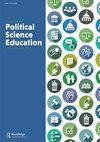模拟欧洲联盟政府间机构的研讨会:部长理事会和合格多数表决
IF 0.6
Q3 POLITICAL SCIENCE
引用次数: 0
摘要
本文章由计算机程序翻译,如有差异,请以英文原文为准。
Seminar Simulations of the European Union’s Intergovernmental Institutions: The Council of Ministers and Qualified Majority Voting
Abstract The case for the use of simulations in political science seminars to provide illustrative learning of complex political process has been well demonstrated across a variety of sub-disciplines within political science. Their value to the teaching of European Union politics has also been explored and is particularly valuable for the EU’s numerous examples of complex decision-making processes. This is particularly true of the EU’s Qualified Majority of Voting (QMV) system used in its Council of Ministers. This article demonstrates the use of a QMV simulation for undergraduate EU politics classes. Achievement of learning outcomes was greatly improved versus the standard Socratic seminar method and was in confirmed student feedback.
求助全文
通过发布文献求助,成功后即可免费获取论文全文。
去求助
来源期刊

Journal of Political Science Education
POLITICAL SCIENCE-
CiteScore
1.80
自引率
36.40%
发文量
69
期刊介绍:
The Journal of Political Science Education is an intellectually rigorous, path-breaking, agenda-setting journal that publishes the highest quality scholarship on teaching and pedagogical issues in political science. The journal aims to represent the full range of questions, issues and approaches regarding political science education, including teaching-related issues, methods and techniques, learning/teaching activities and devices, educational assessment in political science, graduate education, and curriculum development. In particular, the journal''s Editors welcome studies that reflect the scholarship of teaching and learning, or works that would be informative and/or of practical use to the readers of the Journal of Political Science Education , and address topics in an empirical way, making use of the techniques that political scientists use in their own substantive research.
 求助内容:
求助内容: 应助结果提醒方式:
应助结果提醒方式:


